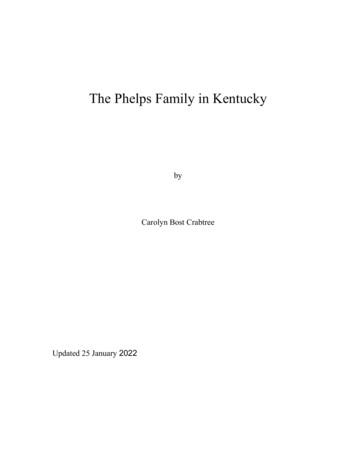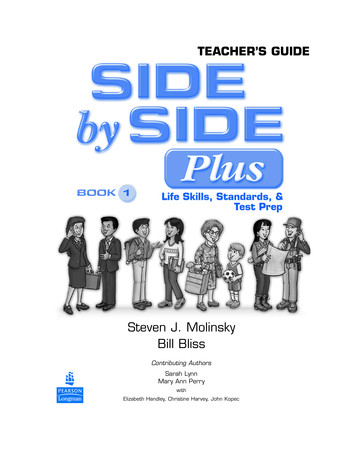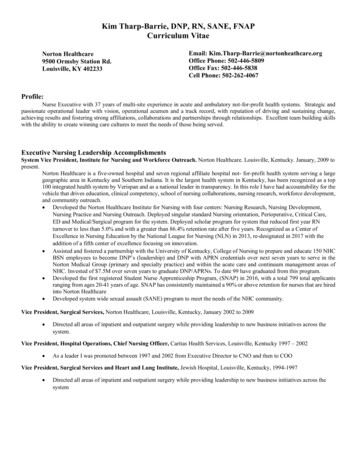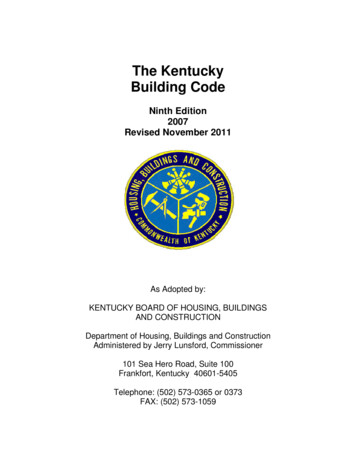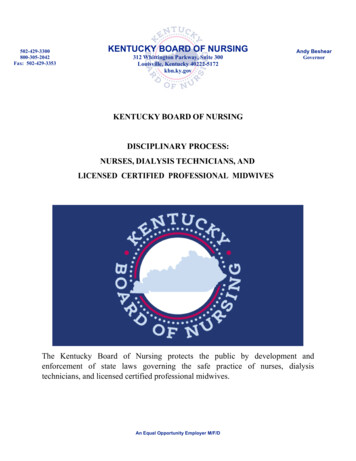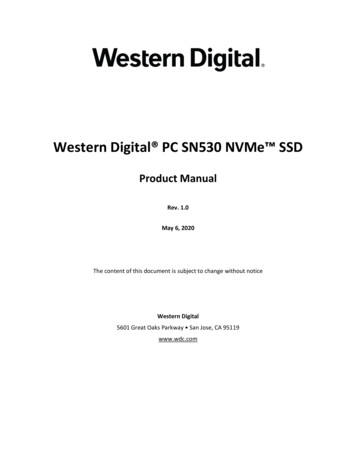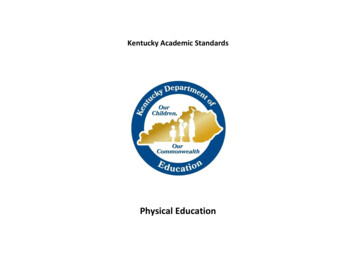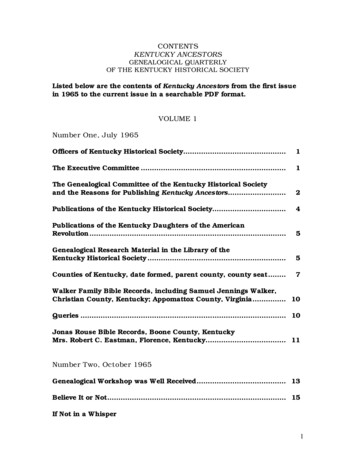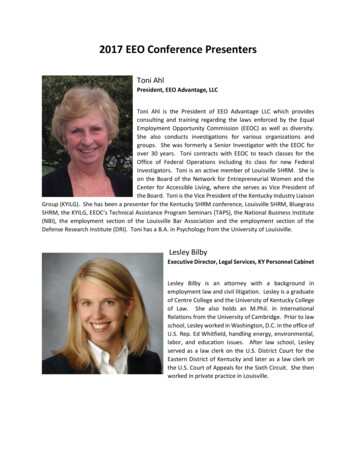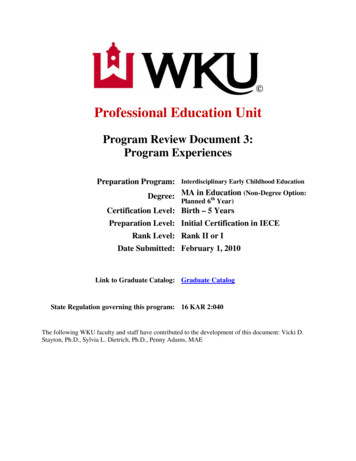
Transcription
Professional Education UnitProgram Review Document 3:Program ExperiencesPreparation Program:Interdisciplinary Early Childhood Education(Non-Degree Option:Degree: MA in EducationthPlanned 6 Year)Certification Level: Birth – 5 YearsPreparation Level: Initial Certification in IECERank Level: Rank II or IDate Submitted: February 1, 2010Link to Graduate Catalog: Graduate CatalogState Regulation governing this program: 16 KAR 2:040The following WKU faculty and staff have contributed to the development of this document: Vicki D.Stayton, Ph.D., Sylvia L. Dietrich, Ph.D., Penny Adams, MAE
PRD3 IECE IP (Graduate) Page 2 of 27IntroductionProgram Relationship to Unit Conceptual Framework and Continuous Assessment PlanWKU’s Conceptual Framework represents beliefs and values that are shared by all programs that prepareuniversity students to enter education professional fields. These fields include: Teachers in elementary, middle, and high schoolsLibrary media specialistsPrincipals and superintendentsSchool counselorsSchool nursesSchool psychologistsSpeech pathologistsAll these education professional preparation programs are considered by the National Council forAccreditation of Teacher Education (NCATE) and Kentucky’s Education Professional Standards Board(EPSB) to represent WKU’s Professional Education Unit. Faculty representatives from each of theeducation fields in the Unit were involved in various aspects related to the development and approval ofthe Conceptual Framework. An abridged version of the Conceptual Framework is attached to thisdocument as Appendix A.It is important to note that during the development of the Conceptual Framework, committee membersthought it important to delineate all essential beliefs, ideas, and implications even if they were difficult tomeasure or live out. Thus, many beliefs, ideas, or implications reflect what the unit aspires to accomplishover time.Based on these values, the Professional Education Council adopted the unit-wide Continuous AssessmentPlan. From this plan, each program developed a Program Assessment Plan (Appendix B). As can be seenfrom our plan, the first “Continuous Assessment Matrix” maps out how our program attempts to live outthe unit-wide assessment vision. The “Critical Performance Assessment Alignment Matrix” describes theassessments that our program uses to measure candidate progress toward the Kentucky TeacherStandards. Unless noted, all these assessments are collected within the unit’s Electronic Portfolio andAccountability Systems and are used to guide decisions as indicated in the Transition Points described inthe Program Assessment Plan. The “Other Key Data Collection Matrix” identifies where other unit-widedata related to the unit Conceptual Framework are collected within our program.Furthermore, to ensure that all our program candidates work with diverse students, we have identified thefinal clinical experience placement associated with IECE 524 Internship in Interdisciplinary EarlyChildhood Education (IECE) as the designated experience where candidates are placed in diverse settings.We determined our most diverse settings by averaging the ethnic diversity of the schools in our servicearea (about 11%) and selecting settings as diverse that exceed this percentage. The following courses,assessments, and experiences provide additional opportunities for our program candidates to addresstopics related to diversity:IECE 521 Assessment in IECE – Critical Performance: Students assess children who are culturally andlinguistically diverse and with diverse learning needs using formal and informal assessments and preparea written summary report interpreting the results and providing recommendations.
PRD3 IECE IP (Graduate) Page 3 of 27IECE 523Observation and Assessment of Learning Environments – Critical Performance: Studentsassess an infant/toddler and preschool learning environment using the Infant Toddler Environment RatingScale – Revised and the Early Childhood Environment Rating Scale – Revised. The assessment addresseslearning environments for all children including those who are culturally and linguistically diverse andrepresent various learning needs.EXED 523 Standards Based Unit - Critical Performance: Students develop a Standards Based Unit forInfants and Toddlers and one for Preschoolers. The unit must be appropriate for all children includingthose who are culturally and linguistically diverse and represent various learning needs.Finally, after the Professional Education Council adopted a unit-wide set of dispositions (see AppendixA), our program has identified the following courses and experiences where we or other field observers(e.g., cooperating teachers) assess our students’ display of behavior associated with these dispositions:IECE 521 Assessment in IECE – University Instructor EvaluationIECE 523 Advanced Curriculum – University Instructor EvaluationIECE 524 Internship in IECE – University Supervisor EvaluationProgram Overview Brief Program DescriptionThe IECE program may be used for the Kentucky Rank II or Rank I pay status and is designed to addressthe needs of Early Childhood Educators by: (a) providing high quality personnel preparation that isbased on recommended practices and state and national personnel standards for individuals who areinterested in working with children ages birth to primary, both with and without disabilities, and theirfamilies; (b) ensuring that community programs have available well-prepared professionals andparaprofessionals to provide services for children birth to primary, both with and without disabilities, andtheir families; and (c) collaborating with community programs to ensure that children ages birth toprimary, both with and without disabilities, and their families, have access to family-centered supportsand services that adhere to recommended practices in the field.The IECE MAE and Planned Sixth Year Programs lead to initial certification in IECE. For candidateswho have teacher certification in an area other than IECE, IECE certification will be an additionalcertification. For candidates who have no prior teacher certification, IECE certification will be theirinitial (first) teacher certification.Program candidates include individuals who: (1) are certified in some other area of teacher education(e.g., elementary education); (2) have a bachelor’s degree in a non teacher education field, meet thecriteria for the IECE probationary certificate, and have completed IECE KTIP; and (3) have a bachelor’sdegree and do not have any type of teacher certification. The first two groups of candidates completefield experiences integrated throughout the program of study and IECE 524 Internship in IECE.Candidates in group three complete additional supervised field experience hours in EXED 523 andadditional supervised hours in IECE 524 to meet the 12 week clinical experience. These clinicalexperiences are in consecutive terms with candidates placed in settings with children in two of thefollowing three age ranges: infant/toddler, preschool, kindergarten.Courses in the IECE program are offered in a variety of delivery formats including face to face inBowling Green, web and IVS from Bowling Green to Owensboro, Elizabethtown and Glasgow. Someface-to-face courses meet on Saturdays in combination with another format. Specifics are outlined in thetable below.
PRD3 IECE IP (Graduate) Page 4 of 27IECE Course Delivery (W Web, F2F Face-to-Face, IVS Interactive Video System, S Saturday, BG Bowling Green, O Owensboro, E Elizabethtown, G Glasgow)CourseIECE 520IECE 521IECE 522IECE 523IECE 524EXED 523CD 481GCD 486 GCFS 577SWRK 436GPSY 645EDFN 500**Not required for Rank I. Delivery FormatFall semesters W/IVSFall semesters F2FSpring semesters F2F with 2 SFall semesters F2F with 2 SSummers F2FSpring semesters F2F with 4 SFall semesters Web/F2FSummers Web/F2FSpring semesters WebSummers F2FSpring semesters Web/F2F/2 SFall, Spring, Summer semesters WebCampusBG, O, E, GBGBGBGBGBG2 meetings in BG2 meetings in BGBGBGStandards Addressed by ProgramKentucky Teacher StandardsIECE, B-P Kentucky New Teacher Standards (Based on the NAEYC, DEC/CEC and CEC)National Association of Early Childhood Educator’s Standards for ProgramsCouncil for Exceptional Children’s (CEC ) Common CoreDivision for Early Childhood of the CEC’s Personnel StandardsA. Content Standards1. Course Descriptions Core Education CoursesCD 481G, Speech and Language Development (3 hours) - An introduction to the field of speechpathology dealing with the development of speech and language, and the cause and treatment of thesimpler deviations from normal speech and language. The course will deal with identification of the morecommon speech problems and suggestions for the remediation of those problems.CD 486G, Language Disorders (3 hours) - Identification, evaluation, and treatment techniques andoptions to be used with children diagnosed as language delayed.SWRK 436G, Services to Children (3 hours) - The course is designed to acquaint the student with abroad overview of social services to children, commonly referred to as Child Welfare Services. Theemphasis shall be on program resources and services to meet the well-being of children and their families.EDFN 500, Research Methods (3 hours) - Introduction to research methods in education, informationretrieval systems, basic types of research, research procedures, research designs, and discussion ofmethods of data analysis to facilitate the understanding of research journals in the student's field of study.IECE 520, Organizing Programs for IECE (3 hours) - Rationale for IECE for children birth throughfive years of age, service delivery options, teaming issues, and atypical development specific to sensory,physical, and cognitive disabilities. Thirty hours of field experiences are required.
PRD3 IECE IP (Graduate) Page 5 of 27IECE 521, Assessment in IECE (3 hours) - This course examines the assessment process specific tochildren birth through five years of age both with and without special needs and their families. Studentswill practice administering screening and diagnostic assessment tools and implement the arena assessmentprocess. Thirty clock hours of field experience are required.IECE 522, Family-Centered Services (3 hours) - Students apply family systems theory to familyassessment, the development of family plans, and the implementation and evaluation of family-centeredservices. Thirty hours of field experiences are required.IECE 523, Planning Curriculum and Instruction in Interdisciplinary Early Childhood Education (3hours) - IECE 523 focuses on planning, designing, and selecting curricula, including learningenvironments and instruction for children with varied abilities (birth through kindergarten) and theirfamilies. A minimum of 15 clock hours of field experience is required.IECE 524, Internship in IECE (3 hours) - Supervised work with children between the ages of birth andfive, both with and without disabilities, and their families.EXED 523, Advanced Methods and Materials in Early Childhood Education andCurriculum/Methods in Early Childhood Special Education (3 hours each) - Examines curricula,instructional strategies, and support materials for children with varied abilities (birth throughkindergarten) and their families. Planning, implementation, and evaluation of instruction will beemphasized. Minimum of 30 hours of field experience is required.CFS 577, Seminar in Child Development (3 hours) - Analysis of current theories and research relevantto the development of social perceptual-cognitive, and physical-physiological processes in children.PSY 645, Consultation in Educational and Mental Health Settings (3 hours) - This course is designedto provide theory and practice opportunities for professionals serving children in interdisciplinarycollaboration for the delivery of services for children (Birth through 5 years) with disabilities, and theirfamilies. The various theories and methods of consultation, teaming, and collaboration will be covered.Field experience hours are required.2. Standard Alignment Matrices Program Alignment to Kentucky Teacher StandardsAppendix B contains our Program Assessment Plan. The “Critical Performance Assessment AlignmentMatrix” describes the assessments that our program uses to measure candidate progress toward theKentucky Teacher Standards. Program Alignment to Learned Society Standards: IECE B-P Kentucky Teacher StandardsTable 1 demonstrates the alignment of our content courses with our learned society standards.IECE 520 Organizing Programs for IECEIECE, B-PStandards1,2,5,6,7, 10NAEYCStandards1,5DECStandards1,2,3,9,10CEC CommonCore1,2,3,9,10IECE 521 Assessment in ECE 522 Family-Centered Services4,5,6,7,82,3,4,51,2,3,6,7,8,9,101,2,3,8,9, 10IECE 523 Planning Curriculum andInstruction in ,9,10Course # and Title
PRD3 IECE IP (Graduate) Page 6 of 27IECE 524 Internship in ,101,2,3,4,5,6,7,8,9,10EXED 523 Advanced Methods andMaterials in Early Childhood Educationand Curriculum/Methods in EarlyChildhood Special 8,9,102,3,4,5,6,7,8,9,10CD 481G Speech and LanguageDevelopment1,3,4,51,41,2,3,61,2,36CD 486G Language FS 577 Seminar in Child Development1,5,822,3,6,92,3,6,9SWRK 436G Services to Children5,82,51,2,7,9,101,2,3,5,7,9,10PSY 645 Consultation in Educational andMental Health . Courses/Experiences that Address the Professional Code of EthicsGraduate students who enter the IECE program without teacher certification must be admitted intoWKU’s initial teacher preparation programs, they must first attend a Teacher Orientation during whichthe EPSB’s Professional Code of Ethics is discussed. At the conclusion of the orientation, candidatesmust sign that they have read and are committed to upholding the code of ethics.In addition, the CEC, DEC, and NAEYC codes of ethics are discussed and applied via a DiscussionBoard assignment in IECE 520, Organizing Programs in IECE.B. KERA InitiativesThe Combined Curriculum Document (CCD), located at the following url:http://www.education.ky.gov/KDE/Instructional Resources/Curriculum Documents and Resources/Teaching Tools/Combined Curriculum Documents/, is aresource created by the Kentucky Department of Education to show the connection between theAcademic Expectations (what students should know and be able to do as a result of their schoolexperience), the Program of Studies (the minimum required content standards students shall be taught tomeet the high school graduation requirements), and the Core Content for Assessment (the content that isappropriate to be included on the state assessment). The CCD subsumes these three Kentucky P-12curriculum requirements under the umbrella of “Big Ideas.” Table 2 describes how we introduce ourcandidates to the CCD and to each of the “Big Ideas” associated with our education preparation program,as well as how we ensure our candidates are prepared to teach these concepts to meet the KDE P-12curriculum requirements in their future P-12 classrooms.The IECE, B-P, M.A.E. program addresses the KERA initiatives of Learner Goals and AcademicExpectations, Early Childhood Standards, and Early Childhood Core Content for Assessment throughoutthe program’s curriculum. Table 2 indicates the alignments of IECE courses with these initiatives. IECEstandards are addressed throughout the curriculum as outlined in the IECE program assessment plan.
PRD3 IECE IP (Graduate) Page 7 of 27CourseIECE 523EXED 523EXED 523IECE 524Table 2: Program Alignment to KERA Initiatives for IECEAcademic ExpectationsCore Content forKY Early Childhood(AE)Assessment (CC)Standards (ECS)Students complete anStudents complete anStudents complete aninclusion matrix,inclusion matrix,inclusion matrix,collaborate with family and collaborate with family and collaborate with family andcolleagues, and evaluatecolleagues, and evaluatecolleagues, and evaluatelearning environmentslearning environmentslearning environmentsbased on AE, CC, and ECS. based on AE, CC, andbased on AE, CC, andECS.ECS.Students develop aStudents develop aStudents develop aStandards Based UnitStandards Based UnitStandards Based Unit(SBU) which includes at(SBU) which includes at(SBU) which includes atleast eighteen KTIP lessonleast eighteen KTIP lesson least eighteen KTIP lessonplans based on the AE, CC, plans based on the AE, CC, plans based on the AE, CC,and ECS. The SBU alsoand ECS. The SBU alsoand ECS. The SBU alsoincludes an assessment plan includes an assessmentincludes an assessmentwith pre- and postplan with pre- and postplan with pre- and postassessment and ongoingassessment and ongoingassessment and ongoingassessment; strategies forassessment; strategies forassessment; strategies forinvolving families; andinvolving families; andinvolving families; andmodifications for learningmodifications for learningmodifications for learningcenters.centers.centers.Students complete aStudents complete aStudents complete asupervised 30 hour fieldsupervised 30 hour fieldsupervised 30 hour fieldexperience in either a Firstexperience in either a First experience in either a FirstSteps or a state fundedSteps or a state fundedSteps or a state fundedpreschool setting. KTIPpreschool setting. KTIPpreschool setting. KTIPlesson plans are developedlesson plans are developed lesson plans are developedand implemented with theand implemented with the and implemented with thereflection addressing thereflection addressing thereflection addressing theapplication of AE, CC, and application of AE, CC, and application of AE, CC, andECS.ECS.ECS.Students complete a fiveStudents complete a fiveStudents complete a fiveweek internship placementweek internship placement week internship placementin either an infant/toddlerin either an infant/toddlerin either an infant/toddleror preschool settingor preschool settingor preschool settingdeveloping lessons plansdeveloping lessons plansdeveloping lessons plansbased on the AE, CC, andbased on the AE, CC, andbased on the AE, CC, andECS. Students mustECS. Students mustECS. Students mustdevelop and implement andevelop and implement an develop and implement aninstructional unit for oneinstructional unit for oneinstructional unit for oneweek. Students must reflect week. Students must reflect week. Students must reflecton the unit and analyzeon the unit and analyzeon the unit and analyzestudent learning . Thestudent learning . Thestudent learning . Thestudents also implementstudents also implementstudents also implementactivities with families and activities with families and activities with families andcollaborate with othercollaborate with othercollaborate with otherprofessionals.professionals.professionals.
PRD3 IECE IP (Graduate) Page 8 of 27C. EPSB ThemesOur program is committed to graduating education professionals who are prepared to work with diversestudents, to assess student learning, to understand the importance of literacy across the curriculum, and toclose the achievement gap. Table 3 below delineates the courses in our program that ensure thateducation candidates are prepared in these areas.Table 3: How Program Addressed EPSB ThemesIECE SDiversityEPSB ThemesXIECE 522XXXIECE 523XXXXEXED 523XXXXCD 486GXXXXIECE 524XXXXHow Course Addresses ThemeStudents conduct a variety of standardized assessments todetermine child’s overall level of development and developindividual plans to address areas of need to close theachievement gap.Students implement family assessment with diversefamilies, determine family’s strengths and concerns,develop outcomes to address areas of need, and implementand evaluate 1-2 outcomes with child and family.Students develop an inclusion matrix and task analysis tofacilitate closing the achievement gap for children withdisabilities.Students develop a Standards Based Unit with an ongoingassessment plan designed to address student learning needsand close the achievement gap.Students develop emergent literacy activities based onindividual needs, including ability and cultural andlinguistic diversity in order to close the achievement gap.During the five-week internship, students are placed indiverse settings where they plan, implement, assess, andreflect on differentiated lessons.D. Program FacultySee Table 4 on the next page.
PRD3 IECE IP (Graduate) Page 9 of 27Table 4: Education and Content Faculty InformationFaculty Name1Highest Degree,Field, & UniversityAssignment:Indicate the role(s)of the facultymember 1Faculty Rank 2Scholarship 3, Leadership inProfessional Organizations, andService 4: List up to 3 majorcontributions in the past 3 years 5Sylvia L. DietrichPh.D., SpecialEducation - InclusiveEarly ChildhoodEducation, Universityof TennesseeFacultyAssistantProfessor1)Scholarship – article nationalpeer reviewed journal. Stayton, V.D.,Dietrich, S.L., Smith, B.J., Bruder, M.B.,& Swigart, A. (2009). State certificationrequirements for early childhood specialeducators. Infants and Young Children,22(1) .2)Leadership – officer nationalorganization. Membership chair smallspecial education program caucus of theteacher education division of the councilfor exceptional children3)Service – college of educationrepresentative to WKU’s generaleducation task. Recommended by theDean of the college of education andAppointment by the Provost.Penny AdamsRank 1, IECE, WKUFacultyInstructor1) Autism Consultant, Bowling GreenIndependent Schools, 2007-PresentTeaching orotherprofessionalexperience inP-12 schoolsElementarySpecialEducationTeacher 19911996ElementarySpecialStatus toinstitution&educationunit 6FT/FTFT/FTFor example, faculty, clinical super clinical supervisor, department chair, etc.For example, professor, associate professor, assistant professor, adjunct professor, instructor, administrator, etc.3Scholarship is defined by NCATE as systematic inquiry into the areas related to teaching, learning, and the education of teachers and other school personnel.Scholarship includes traditional research and publication as well as the rigorous and systematic study of pedagogy, and the application of current research findings innew settings. Scholarship further presupposes submission of one’s work for professional review and evaluation.4Service includes faculty contributions to college or university activities, schools, communities, and professional associations in ways that are consistent with theinstitution and unit’s mission.5For example, three contributions of scholarship, leadership, and service might be 1) Scholarship - article published in a specific journal, 2) Leadership - officer of astate or national association,and 3) Service - an evaluation of a local school program. NOTE: You MUST provide evidence of SCHOLARSHIP.6Use these codes: FT/FT – full time to the university and full time to the unit/program; FT/PT – full time to the university and part time to the unit/program; or,PT/PT – part time to the university and part time to the unit/program.2
PRD3 IECE IP (Graduate) Page 10 of 272) Kentucky Department of Education,Teacher Educator, Kentucky TeacherInternship Program, 2008 - PresentDarbi Haynes-LawrencePh.D., IndianaUniversity, ChildStudiesFacultyAssistantProfessor1) Scholarship - Haynes-Lawrence, D.(2009) Crisis nurseries: Emergencyservices for children and families in need.Child care exchange.2)Leadership: Chairperson - MasterScholars Committee CHHS - 2006-20083) Service: (community) Executive Boardmember - Ark Crisis NurseryElizabeth L. JonesPh.D., Psychology,University of GeorgiaFacultyAssociateProfessorJanice Carter SmithM.S., SpeechLanguage Pathology,U of KentuckyFacultyInstructorVicki Diane StaytonPh.D., IECE, UIllinois UrbanaChampaignFacultyProfessor1) Dietrich, S., Jones, E. & Stayton, V.(2007, April). Developmentallyappropriate use of technology in earlychildhood classrooms. Paper presented atthe annual meeting of the Council forExceptional Children, Louisville, Ky.2) Leadership - Member, ProfessionalEducation Committee, College ofEducation And Behavioral Sciences 2008present3) Service - Board Member, Barren RiverArea Development District DEIC1) Poster Presentation, ASHA 2008,Chicago, IL2) Mini-seminar at Kentucky Conferenceon Communication Disorders, 20081) Scholarship – article national peerreviewed journal. Stayton, V.D., Dietrich,S.L., Smith, B.J., Bruder, M.B., &EducationTeacher 19861990 KERAPreschoolTeacher 19902004ElementarySpecialEducationTeacher 20042007FT/PT1978-87SchoolPsychologist,Greenville, SC1987-89SchoolPsychologistHomer, GAFT/PTSLP 15 yearsFT/PTSummers1970-1974Head StartFT/FT
PRD3 IECE IP (Graduate) Page 11 of 27Gary L. VillerealPh.D., Social Work,The University ofPittsburgFacultyAssociateProfessorSwigart, A. (2009). State certificationrequirements for early childhood specialeducators. Infants and Young Children,22(1) .2) Leadership – Division for EarlyChildhood of the Council for ExceptionalChildren, co-chair professionaldevelopment needs assessment committeeand member, advanced personnelstandards committee.3) Service – Chair, ComprehensiveSystem of Personnel DevelopmentCommittee of the Kentucky EarlyIntervention System Interagencycoordinating Council.1) Scholarship - Villereal, G. L. (2006).Guatemala current and future globalization:Social work’s continuing education role.International Social Work, 50(1), 41-51.2) Leadersip - Member Diversity IssuesCommittee. 2007- 2010, National CollegiateHonors Council3) Service - Graduate Council memberAssistant andTeacher, KY1974-76 EarlyChildhoodSpecialEducationTeacher, TN1981-82 EarlyChildhoodSpecialEducationTeacher, KYFT/PT
PRD3 IECE IP (Graduate) Page 12 of 27E. WKU Curriculum ContractInterdisciplinary Early Childhood Education (IECE)Master of Arts in EducationLeading to the Provisional Certificate for IECE B-5 yearsContact Information:Last,FirstMiddleWKU ID NumberStreetHome Phone NumberCityStateZip CodeE-mail AddressSpecific degree requirements with advisement sheets attached.Professional Education StudiesContent CoursesIECE 521IECE 522IECE 523IECE 524EXED 523CD 481GCD 486GIECE 520CFS 577SWRK 436GPSY 6453 hrs.3 hrs.3 hrs.3 hrs.3 hrs.3 hrs.3 hrs.Other Courses3 hrs.3 hrs.3 hrs.3 hrs.EDFN 5003 hrs.Grand Total of Hours.36Prerequisite Course: EXED 330 or EXED 516 (or equivalent course) 3 hrs.
PRD3 IECE IP (Graduate) Page 13 of 27WESTERN KENTUCKY UNIVERSITY --- CURRICULUM CONTRACTMaster of Arts in Education Interdisciplinary Early Childhood Education (IECE)Leading to the Provisional Certificate for Teaching IECE B – 5 yearsPROFESSIONAL EDUCATION COURSESIECE 5213IECE 5223IECE 5233IECE 5243EXED 5233CD 481G3CD 486G3CONTENT COURSESIECE 520CFS 577SWRK 436GPSY 6453333TOTAL 12-----------------------------------------OTHER COURSESEDFN 5003PREREQUISITE COURSEEXED 330 or 5163TOTAL :Professional Education CoursesContent CoursesOther CoursesTOTAL 3621123
PRD3 IECE IP (Graduate) Page 14 of 27E. WKU Curriculum ContractInterdisciplinary Early Childhood Education (IECE)Planned Sixth Year ProgramLeading to the Provisional Certificate for IECE B-5 yearsContact Information:Last,FirstMiddleWKU ID NumberStreetHome Phone NumberCityStateZip CodeE-mail AddressSpecific degree requirements with advisement sheets attached.Professional Education StudiesContent CoursesECE 521IECE 522IECE 523IECE 524EXED 523CD 481GCD 486GIECE 520CFS 577SWRK 436GPSY 6453 hrs.3 hrs.3 hrs.3 hrs.3 hrs.3 hrs.3 hrs.3 hrs.3 hrs.3 hrs.3 hrs.Grand Total of Hours.33Prerequisite Course: EXED 330 or EXED 516 (or equivalent course) 3 hrs.WESTERN KENTUCKY UNIVERSITY --- CURRICULUM CONTRACTRank I in Education Interdisciplinary Early Childhood Education (IECE)Leading to the Provisional Certificate for Teaching IECE B – 5 yearsPROFESSIONAL EDUCATION COURSESIECE 5213IECE 5223IECE 5233IECE 5243EXED 5233CD 481G3CD 486G3CONTENT COURSESIECE 520CFS 577SWRK 436GPSY 6453333TOTAL ISITE COURSEEXED 330 or 5163TOTAL :Professional Education CoursesContent CoursesOther CoursesTOTAL 3321123
PRD3 IECE IP (Graduate) Page 15 of 27Delineation of Unit/Program Transition PointsTransition Point 1: Admission to Education Preparation ProgramsData ReviewedUnit Level Data: Admission Application Undergraduate Degree GAP Score (UG GPA x GRE) GRE Analytic WritingData ReviewedProgram Specific Data GPA Course Completion Oral Comprehensive ExamReviewed ByEachMonthGraduateStudiesReviewCycleReviewed ByAnnuallyProgram FacultyReviewCycleReviewed ByAnnuallyProgram FacultyCompletion of applicationEvidence of degree2200 3.5 Transition Point 2: Admission to Culminating Assessment Data ReviewedProgram Specific Data GPA Graduate Course Completion Dispositions Scores Critical Performance ScoresReviewCycleMinimal Criteria for Admission/ContinuationMinimal Criteria for ContinuationMinimum 3.0 GPAEnrollment in final courses in majorAll dispositions average “At Standard” (3 )3.0 overall2.5 per Kentucky IECE Teacher StandardmeasuredTransition Point 3: Program Exit Minimal Criteria for Exit Minimum 3.0 GPA Degree program of study completed “P” (pass) obtained on all IECE StandardsRemediation Opportunities:TP 1: Candidates who do not qualify for the MAE, may choose Rank II or I options.TP 2: Candidates may request additional instruction from faculty and may resubmit Critical Performances inorder to improve their scores
The IECE MAE and Planned Sixth Year Programs lead to initial certification in IECE. For candidates who have teacher certification in an area other than IECE, IECE certification will be an additional certification. For candidates who have no prior teacher certification, IECE certification will be their initial (first) teacher certification.

